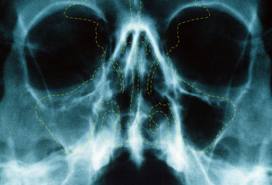Patients who undergo radiotherapy for nasopharyngeal carcinoma tend to suffer from sinusitis because irradiation causes damage to sinonasal tissue. There is very little information about the organisms causing sinusitis after radiation therapy. Two recent studies provided important information about the unique microbiology of sinusitis in these patients.
One study evaluated 25 patients with acute sinusitis and the other evaluated 30 with chronic sinusitis. Both studies found higher recovery of Staphylococcus aureus in irradiated individuals. Because of the high prevalence of methicillin resistant S. aureus (MRSA
These studies underscore the need to obtain appropriate cultures from patients with chronic sinusitis who were irradiated so that proper antimicrobials can be administered to them.
X rays film showing right maxillary sinusitis:

